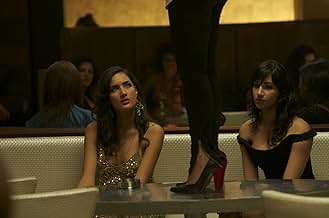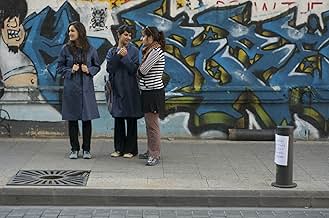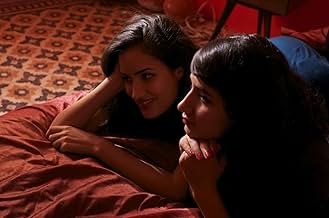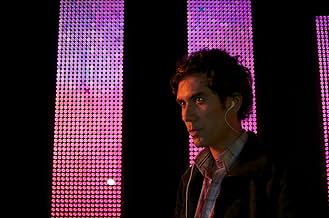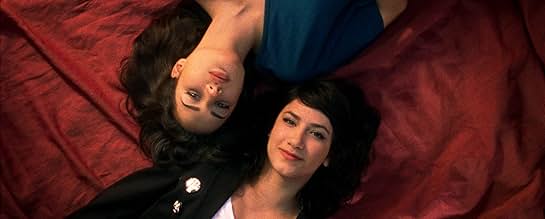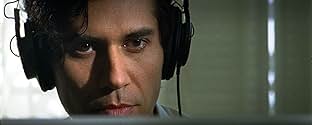VALUTAZIONE IMDb
5,9/10
8174
LA TUA VALUTAZIONE
Una ricca famiglia iraniana lotta per contenere la crescente ribellione sessuale di una adolescente e la pericolosa ossessione del fratello.Una ricca famiglia iraniana lotta per contenere la crescente ribellione sessuale di una adolescente e la pericolosa ossessione del fratello.Una ricca famiglia iraniana lotta per contenere la crescente ribellione sessuale di una adolescente e la pericolosa ossessione del fratello.
- Premi
- 11 vittorie e 9 candidature totali
Keon Alexander
- Joey
- (as a different name)
Amir Hossein Soleimani
- Payam
- (as Amir Soleimani)
Sirvart Fazlian
- Shireen's Grandmother
- (as Siro Fazlian)
Hadi Tabbal
- Molesting Taxi Driver
- (as Hady Tabbal)
Recensioni in evidenza
This film could be a good movie if the film crew knew more about the new generation, specially the girls in Iran. As an Iranian I couldn't believe the main characters. in comparison I can say that the character and performing of Shaun Toub in Crash(2004) and Ben Kingsley in House of sand and fog(2003) that both are non-Iranian, were more believable as Iranian than them. they cannot behave like an Iranian because they don't live in Iran and most of them have never been to Iran(according to IMDb).So each of them is completely performing as a teenager that has been growing in a different culture other than Iran. the film location and its elements are totally nonsense and different with Iran and what is important is that the audience who are familiar with Iranian culture and Iran can easily feel this differences. the Brother personality is very rare among Iranian youth and his behavior is overstated. in nutshell it is not about Iranian circumstances but it is about circumstances which can be related to an Iranian family who live in a foreign country but they think they should still consider some circumstances.
I recently met Maryam Keshavarz after watching a screening of Circumstance. A lot of the reviews here complain that it is unrealistic and that she has no basis of Iranian culture and that the actors aren't from Iran, etc. But Keshavarz's family is from Iran and she spent a lot of time there as a child. She based Mehran's character off of her uncle who made a similar transition after war. As for the actors, all of them are Iranian. They might not have been living in Iran, but she said all of them are from Iran. And she could not advertise the roles in Iran.
Secondly, it doesn't look like Iran BECAUSE IT'S NOT. The director was forced to shoot the film in a different country under great suspicion. This film was shot on actual film, not digital, and all of it happened within the span of six weeks. Which is not that long. The cinematography is phenomenal.
And finally. This movie is illegal in Iran. And none of the actors or the director are allowed back to Iran. Ever. I think that says something.
I personally thought this movie was beautiful. The cinematography was good. The plot was enticing and wonderfully executed for the budget and restraints they faced.
I highly recommend this movie.
Secondly, it doesn't look like Iran BECAUSE IT'S NOT. The director was forced to shoot the film in a different country under great suspicion. This film was shot on actual film, not digital, and all of it happened within the span of six weeks. Which is not that long. The cinematography is phenomenal.
And finally. This movie is illegal in Iran. And none of the actors or the director are allowed back to Iran. Ever. I think that says something.
I personally thought this movie was beautiful. The cinematography was good. The plot was enticing and wonderfully executed for the budget and restraints they faced.
I highly recommend this movie.
CIRCUMSTANCE is a brave film from the respected filmmaker Maryam Keshavarz who both wrote and directed this film about contemporary mores and cultural taboos in Iran. It is a film that dares to create a story about family, the youth culture of clubs and drugs and all night music, about the Morality Police who carefully guard the standards of public (and private!) behavior, and about same sex liaisons. It is a beautifully photographed study of star-crossed lovers who happen to both be young teenage girls and the manner in which they cope with their love and with the family and world outside the sanctity of their breathtakingly erotic moments together. Because of the lack of sanctions of the themes of the film which is supposedly set in Tehran the film had to be shot in Lebanon: knowing this adds to the impact of the drama the film so carefully exposes.
Since any public expression of passion is forbidden between Keshavarz's two teenage female protagonists, it brings a whole other level of tension and dread to their shared attraction. Atafeh (Nikohl Boosheri) has the resources and security provided by her wealthy family that allows her to live a double life with her friend and eventual lover, Shireen (Sarah Kazemy). In order to fully explore their feelings, the young women escape into their fantasies of living in a more enlightened land such as Dubai, a haven which is tantamount to Oz. The life of teenage love is difficult enough, but it is even more difficult if that love is between two members of the same sex. Apparently Iran is a country where homosexual relationships can be punishable by death. Atafeh lives in a family of wealth and privilege with her parents (Soheil Parsa and Nasrin Pakkho) and brother, Mehran, (Reza Sixo Safai). Shireen is not of the same class: she lives with her Aunt and Uncle after being orphaned by her parents who were killed by the government for their immoral ways. Atahfeh and Shireen are two teenage school girls who begin as best friends and gradually discover that they are in love. The girls are also rebellious to Iran's strict religious and socialist ways, being caught up in Tehran's underground nightclub scene. Mehran, a former musician and drug addict, has become a radical Muslim and informant for the Morality Police, installing cameras in every room of his home to spy on his family, capturing all the comings and goings of each member of the household, including the trysts between Ayafeh and Shireen, and devises a plan with the Morality Police to marry Shireen after she and Atafeh are arrested by the morality police for partying at a night club. The young lovers discover the circumstances that force them into lives away from each other and the decisions they make (or are made for them) form the conclusion of this haunting film.
Apparently there is great resentment from many Persian viewers who feel the film does not project the real situation in Tehran or in Iran as a whole. This may be true, but the film is not a documentary: Keshavarz has taken an idea and molded with certain flavors and spices and delivers this brave little film by introducing the extraordinary beauty of the two leading actresses. The cast is solid and if the script could use some editing or re-sculpting it still delivers a concept about same sex love and the lack of acceptance that seems to be global. We rarely are able to see Persian films and this one is well worth attention. It is not meant to be factual: it is a story exotically told - and memorable.
Grady Harp
Since any public expression of passion is forbidden between Keshavarz's two teenage female protagonists, it brings a whole other level of tension and dread to their shared attraction. Atafeh (Nikohl Boosheri) has the resources and security provided by her wealthy family that allows her to live a double life with her friend and eventual lover, Shireen (Sarah Kazemy). In order to fully explore their feelings, the young women escape into their fantasies of living in a more enlightened land such as Dubai, a haven which is tantamount to Oz. The life of teenage love is difficult enough, but it is even more difficult if that love is between two members of the same sex. Apparently Iran is a country where homosexual relationships can be punishable by death. Atafeh lives in a family of wealth and privilege with her parents (Soheil Parsa and Nasrin Pakkho) and brother, Mehran, (Reza Sixo Safai). Shireen is not of the same class: she lives with her Aunt and Uncle after being orphaned by her parents who were killed by the government for their immoral ways. Atahfeh and Shireen are two teenage school girls who begin as best friends and gradually discover that they are in love. The girls are also rebellious to Iran's strict religious and socialist ways, being caught up in Tehran's underground nightclub scene. Mehran, a former musician and drug addict, has become a radical Muslim and informant for the Morality Police, installing cameras in every room of his home to spy on his family, capturing all the comings and goings of each member of the household, including the trysts between Ayafeh and Shireen, and devises a plan with the Morality Police to marry Shireen after she and Atafeh are arrested by the morality police for partying at a night club. The young lovers discover the circumstances that force them into lives away from each other and the decisions they make (or are made for them) form the conclusion of this haunting film.
Apparently there is great resentment from many Persian viewers who feel the film does not project the real situation in Tehran or in Iran as a whole. This may be true, but the film is not a documentary: Keshavarz has taken an idea and molded with certain flavors and spices and delivers this brave little film by introducing the extraordinary beauty of the two leading actresses. The cast is solid and if the script could use some editing or re-sculpting it still delivers a concept about same sex love and the lack of acceptance that seems to be global. We rarely are able to see Persian films and this one is well worth attention. It is not meant to be factual: it is a story exotically told - and memorable.
Grady Harp
The first word that comes to my mind for this movie is exaggeration.All the praying and character of "Mehran" and government agents don't make much sense. The director tried to make the city she was filming in like Tehran which was a wrong choice. She tried to focus on faces and removes the attention to background when shooting in city which ruins the depth of the scenes and every single Iranian easily realize that it is not Tehran. Except for "Azar" no other actors or actresses have native accent.The story line is weak and not thoroughly worked. In general, it would be a good idea to show the homosexuals' problems in Iran and discuss it, but it dissolves in exaggerated opinions of director/writer about the whole government issues and forced marriage and specially in captured minds of people (like in 1984). In my opinion, trying to mix these stuff was a bad idea.
As an American, I try to read about what the Iranian regime is up to every day. It's a scary, dangerous place, that conjures up images of a police state akin to Nazi Germany. Maryam Keshavarz's new film, Circumstance, attempts to reveal the repressive nature of Iranian society by focusing on the relationship between two teenage school girls from Tehran, Atafeh, who lives with her liberal parents and Shireen, raised by an uncle after her dissident parents presumably were murdered by the Mullahs some time after the Iranian Revolution.
Keshavarz spent some time growing up in Iran but it's my understanding that she's been thoroughly ensconced in the USA for quite some time. In interviews, Keshavarz indicates that she based her script on her some of her own experiences as well as the experiences of some her Iranian relatives. Hence, her narrative appears to be written at a distance, with the resulting storyline full of tasty morsels but never quite arriving at the main course.
We do learn about the rebellious, underground youth culture in Iran and there's an interesting scene where Atafeh and Shireen meet up with some friends including an Iranian-American, who conscripts the girls to participate in the dubbing of the American film, 'Milk', into Farsi. It's perhaps the most humorous scene in the entire movie, as the director chastises one of the participants for sounding "too gay" on the soundtrack.
Also interesting is the role of the 'morality police', as they seek to crush the spirit of the many rebellious youth, dissatisfied with repressive governmental policies. While Atafeh's brother, Mehran, ends up as an informer for the police, I wanted to know much more about how the group operates. Atafeh and Shireen are saved through Mehran's connections but I shudder to think of what happens to innocent citizens who don't have a family member to bail them out.
There were other scenes which I had no way of confirming were true. For example, Atafeh's father's assertion that he looks forward to the day that women can swim in the ocean. Some posters who claimed to be from Iran asserted that women are not prevented from swimming besides men. There was also a scene where an extremely sexually frustrated cabbie masturbates while fondling one of the girl's feet. Again, it's difficult to know whether this type of behavior is the norm in such a conservative society. One scene that did ring true was the arrest of the Iranian-American film director. At one point, we can hear a TV news broadcast in the background which notes the young man's arrest and that he is an American-Israeli agent (it would seem to me that anyone with joint Iranian-American citizenship would be insanely foolish to return to Iran at this juncture in time).
Keshavarz wastes quite a bit of time by focusing on the illicit lesbian relationship between Atafeh and Shireen. I would have much preferred the director to have limited the erotic contact to a minimum as it feels more like what American teenagers might do than the kind of behavior we would expect from Iranian girls, presumably much more shy and conservative, than their American counterparts.
Keshavarz attempts to humanize Mehran, having him break down after his marriage to Shireen and her negative response to him in the sack. That short hint of vulnerability is enough for Shireen to turn a cold shoulder toward Atafeh and suddenly embrace the backward Mehran. Not sure if I bought that sudden character transformation. The same goes for Atafeh and Mehran's father who rejects religion when we first meet him but then joins Mehran, bowing to Mecca on a prayer shawl at film's end.
While the film makes much of scenes of surveillance footage, connoting the Big Brother mentality in Iranian society, what's missing is a more nuanced portrait of the bad guys. What actually was Mehran and his superior doing at the party where Atafeh and her mother were singing together? I hardly think that those type of fanatics could have sat there and listened to women singing unless of course they were there seeking out additional intelligence.
For a first feature, 'Circumstance' is visually quite impressive. In the end, however, it's a film that's more style over substance. What was needed was more of a hard-hitting exposé than the tame domestic drama we end up with here.
Keshavarz spent some time growing up in Iran but it's my understanding that she's been thoroughly ensconced in the USA for quite some time. In interviews, Keshavarz indicates that she based her script on her some of her own experiences as well as the experiences of some her Iranian relatives. Hence, her narrative appears to be written at a distance, with the resulting storyline full of tasty morsels but never quite arriving at the main course.
We do learn about the rebellious, underground youth culture in Iran and there's an interesting scene where Atafeh and Shireen meet up with some friends including an Iranian-American, who conscripts the girls to participate in the dubbing of the American film, 'Milk', into Farsi. It's perhaps the most humorous scene in the entire movie, as the director chastises one of the participants for sounding "too gay" on the soundtrack.
Also interesting is the role of the 'morality police', as they seek to crush the spirit of the many rebellious youth, dissatisfied with repressive governmental policies. While Atafeh's brother, Mehran, ends up as an informer for the police, I wanted to know much more about how the group operates. Atafeh and Shireen are saved through Mehran's connections but I shudder to think of what happens to innocent citizens who don't have a family member to bail them out.
There were other scenes which I had no way of confirming were true. For example, Atafeh's father's assertion that he looks forward to the day that women can swim in the ocean. Some posters who claimed to be from Iran asserted that women are not prevented from swimming besides men. There was also a scene where an extremely sexually frustrated cabbie masturbates while fondling one of the girl's feet. Again, it's difficult to know whether this type of behavior is the norm in such a conservative society. One scene that did ring true was the arrest of the Iranian-American film director. At one point, we can hear a TV news broadcast in the background which notes the young man's arrest and that he is an American-Israeli agent (it would seem to me that anyone with joint Iranian-American citizenship would be insanely foolish to return to Iran at this juncture in time).
Keshavarz wastes quite a bit of time by focusing on the illicit lesbian relationship between Atafeh and Shireen. I would have much preferred the director to have limited the erotic contact to a minimum as it feels more like what American teenagers might do than the kind of behavior we would expect from Iranian girls, presumably much more shy and conservative, than their American counterparts.
Keshavarz attempts to humanize Mehran, having him break down after his marriage to Shireen and her negative response to him in the sack. That short hint of vulnerability is enough for Shireen to turn a cold shoulder toward Atafeh and suddenly embrace the backward Mehran. Not sure if I bought that sudden character transformation. The same goes for Atafeh and Mehran's father who rejects religion when we first meet him but then joins Mehran, bowing to Mecca on a prayer shawl at film's end.
While the film makes much of scenes of surveillance footage, connoting the Big Brother mentality in Iranian society, what's missing is a more nuanced portrait of the bad guys. What actually was Mehran and his superior doing at the party where Atafeh and her mother were singing together? I hardly think that those type of fanatics could have sat there and listened to women singing unless of course they were there seeking out additional intelligence.
For a first feature, 'Circumstance' is visually quite impressive. In the end, however, it's a film that's more style over substance. What was needed was more of a hard-hitting exposé than the tame domestic drama we end up with here.
Lo sapevi?
- QuizNikohl Boosheri's debut.
- BlooperAlmost all actors and actresses in the movie have strong foreign accent and can't speak Persian fluently.
- ConnessioniFeatures American Idol: The Search for a Superstar (2002)
- Colonne sonoreBach Cello Suite in D Minor
Written by Johann Sebastian Bach (as J.S. Bach)
Performed by Chris Votek (as Christopher Votek)
Produced by Gingger Shankar
I più visti
Accedi per valutare e creare un elenco di titoli salvati per ottenere consigli personalizzati
- How long is Circumstance?Powered by Alexa
Dettagli
- Data di uscita
- Paesi di origine
- Siti ufficiali
- Lingue
- Celebre anche come
- Koşul
- Luoghi delle riprese
- Aziende produttrici
- Vedi altri crediti dell’azienda su IMDbPro
Botteghino
- Budget
- 1.000.000 USD (previsto)
- Lordo Stati Uniti e Canada
- 454.121 USD
- Fine settimana di apertura Stati Uniti e Canada
- 43.318 USD
- 28 ago 2011
- Lordo in tutto il mondo
- 555.511 USD
Contribuisci a questa pagina
Suggerisci una modifica o aggiungi i contenuti mancanti




